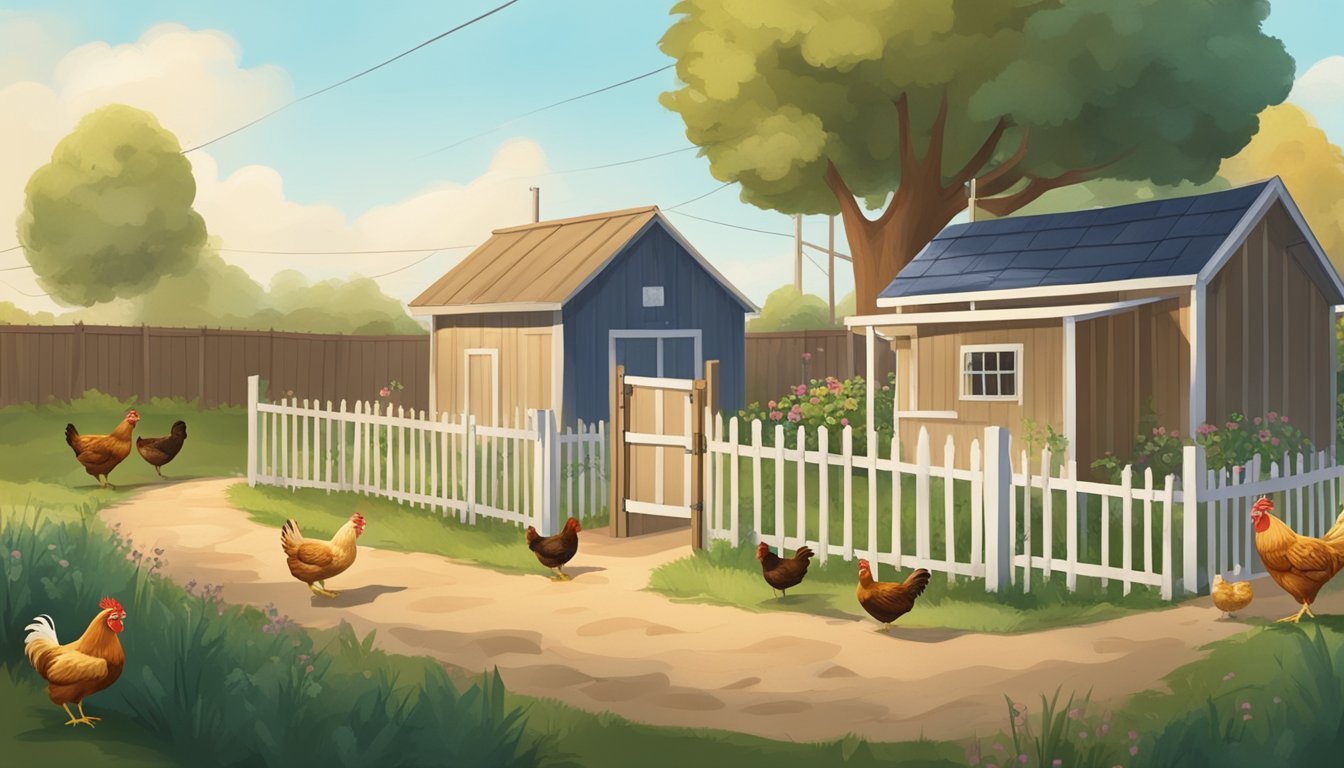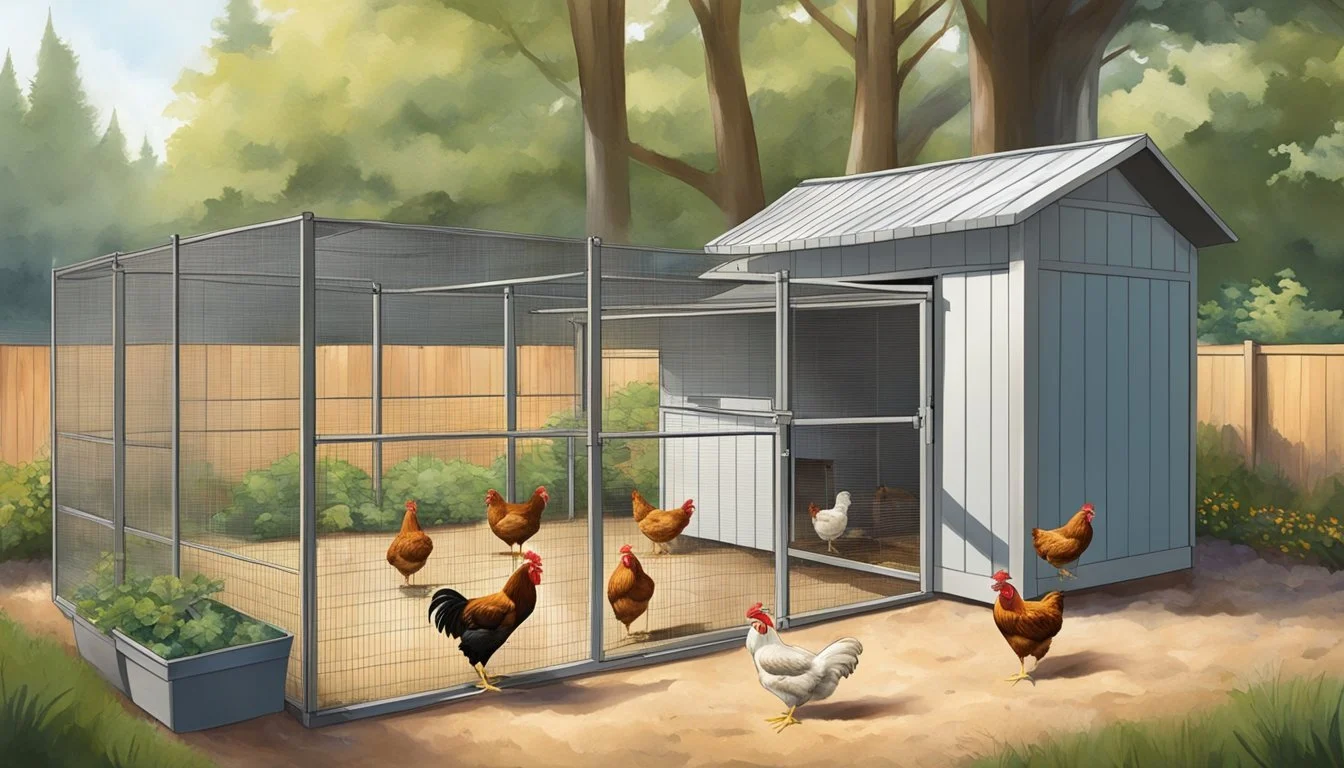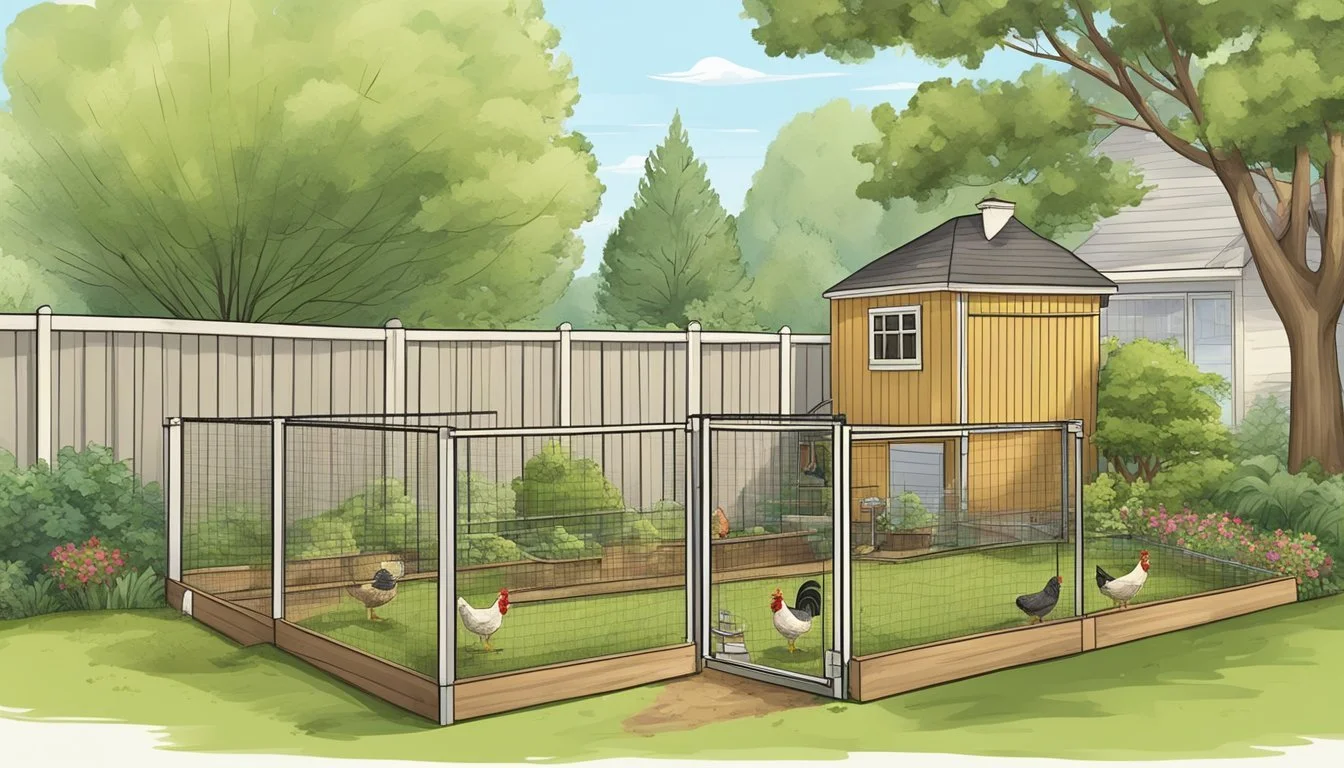Keeping Backyard Chickens in Eugene, OR
Essential Tips for Urban Poultry Farming
Urban farming enthusiasts in Eugene, Oregon, have the opportunity to engage in the rewarding practice of raising backyard chickens. The city's ordinances accommodate this growing trend, striking a balance between the joys of animal husbandry and the necessities of urban living. Careful regulations are in place to ensure that neighbors coexist peacefully, and that the chickens are kept in a humane and healthy environment.
For those interested in raising backyard chickens in Eugene, understanding local laws is the first step to a successful endeavor. The city permits residents to keep up to six chickens over six months of age, alongside a similar number under six months. This limitation is specifically designed for lots that are under 20,000 square feet. The code also extends to the keeping of other domestic fowl within the city limits, providing a framework for residents to enjoy the benefits of fresh eggs and the pleasures of animal companionship.
These urban animal keeping standards reflect an emphasis on sustainability and self-sufficiency within the community. Eugene's approach to animal keeping highlights the importance of compatibility within the urban environment, making sure that while individuals enjoy their backyard poultry practices, they also maintain the serenity and cleanliness of the urban landscape. The city's forward-thinking stance on the urban animal keeping outlines a clear path for aspiring backyard chicken keepers.
Understanding Local Chicken Ordinances
Before starting a backyard chicken farm in Eugene, Oregon, it's crucial to be aware of specific local chicken ordinances that regulate the activity. The City of Eugene has clear rules in place regarding permit requirements, numbers of chickens and other domestic fowl allowed, proximity rules, and regulations pertaining to roosters.
Eugene Chicken Ordinance Overview
Eugene's chicken ordinance clearly outlines the conditions under which residents may keep chickens. It is formulated to ensure the health and safety of both the chickens and the community.
Permit Requirements
City of Eugene: No special permit is required for keeping chickens; however, owners must comply with sanitation and proximity restrictions.
Restrictions on the Number of Chickens
Chickens Allowed: Residents can have:
Up to 6 chickens older than six months.
Additionally, up to 6 chickens and domestic fowl under six months of age in any combination.
Proximity to Property Lines
The ordinance mandates certain distance requirements from property lines to maintain public health standards, although specific numbers are not listed in the provided data.
Rooster Regulations
Roosters: The local laws are often more restrictive when it comes to keeping roosters due to noise concerns. Specific details regarding rooster regulations remain unspecified in the provided snippets.
Other Fowl Regulations
Residents may also keep other types of domestic fowl under similar regulations as chickens. This includes potentially ducks, geese, turkeys, and peacocks, though individual restrictions on these birds are not detailed in the given information.
Note: It's always recommended to review the most current version of the ordinances as amendments may occur.
Setting Up Your Chicken Coop
When raising backyard chickens in Eugene, Oregon, a well-constructed chicken coop is essential for their safety and comfort. A thoughtfully set up coop ensures a healthy living environment that meets both city regulations and the chickens' needs.
Choosing the Right Location
The ideal location for a chicken coop is on high ground to prevent water accumulation and potential flooding. The coop should be positioned to provide the chickens with both sun and shade, maintaining a balance for their well-being throughout the year. One should also consider ease of access for cleaning and egg collection.
Coop Construction and Restrictions
In Eugene, homeowners need to observe specific coop restrictions and may require a building permit, particularly for larger structures. The coop must provide a minimum of 4 square feet per chicken if they have access to an outdoor enclosure. The enclosure, commonly referred to as a "run", should also offer at least 4 square feet per chicken. Good ventilation, insulation, and appropriate roofing are crucial construction elements for the shelter's comfort and durability.
Security Against Predators
A crucial aspect of coop design is safeguarding against predators. This involves using hardware mesh rather than chicken wire for enclosures and burying it around the perimeter to thwart digging. A secure door and reinforced latches can further prevent unwelcome visitors. It's essential to inspect the coop regularly for any vulnerabilities.
Ensuring Adequate Shelter and Comfort
The internal environment of the coop should provide shelter from the elements and a comfortable resting area. Nesting boxes lined with straw or wood shavings should be available for egg laying, with one box for every three to four hens. Roosts should be provided for nighttime perching, with space to prevent overcrowding. Adequate ventilation is key to keep the air fresh and prevent moisture buildup, without creating drafts.
Daily Chicken Care and Management
Proper care and management of backyard chickens involve meticulous attention to their feeding, hydration, health, and living conditions. Each aspect entails a set of specific practices to ensure the well-being and productivity of the flock.
Feeding and Nutrition
Chickens require a balanced diet rich in proteins, carbohydrates, vitamins, and minerals. Keepers should provide:
Starter feed for chicks, with about 18-20% protein content.
Layer pellets for adult hens, containing 16% protein and essential calcium for eggshell formation.
Grit to aid in digestion, which can be scattered around the chicken's living area.
Water Supply and Management
Water is crucial for chickens' survival and productivity. Keepers must ensure:
Clean water is available at all times; waterers should be cleaned regularly to prevent algae and bacteria.
Winter care involves preventing water from freezing with heated waterers or frequent water changes.
Regular Health Checks
Chickens should be observed daily for signs of illness or injury. Key practices include:
Inspection for symptoms like lethargy, abnormal droppings, or respiratory issues.
Weight monitoring to catch early signs of health problems.
Disease Prevention and Control
Disease management is essential for a healthy flock. Keepers should:
Vaccinate chicks against common diseases where advised.
Implement biosecurity measures, such as limiting visitor access to the coop and quarantining new birds before introducing them to the flock.
Neighborhood Considerations and Etiquette
Maintaining backyard chickens in Eugene, OR requires attention to local regulations to ensure a harmonious neighborhood. These guidelines focus on effective communication, noise and waste management, and preventing any disruptions to neighbors.
Communicating with Neighbors
Neighbors should be notified about any intentions to keep chickens. They should be informed that roosters are not allowed due to their noise potential, which could ease any immediate concerns about proximity to the birds. Discussions can include how the chickens are housed and how potential issues will be addressed.
Managing Noise and Waste
Noise can be minimized by not keeping roosters and ensuring hens are properly housed. The management of waste is essential to prevent odors and maintain cleanliness. Waste should be regularly removed or composted to avoid attracting pests. Hens typically produce less noise compared to dogs but timely feeding and upkeep of the coop can prevent any undue noise in the early mornings.
Preventing Nuisance and Trespassing
Precautions should be taken to prevent chickens from escaping and trespassing onto neighboring properties. Enclosures should be secure and chickens should have ample space, following the 1,000 square feet minimum as stipulated by local laws in Eugene, OR. Regular checks can ensure there are no gaps or weaknesses in the fencing. Effective containment maintains good relations with neighbors and ensures the safety of the chickens.
Legal and Community Resources
The residents of Eugene, OR who are enthusiastic about keeping backyard chickens should be aware of the local regulations and have access to supportive resources. These resources are pivotal for maintaining a compliant and healthy urban poultry environment.
Eugene Code and Ordinance Updates
The City of Eugene has specific guidelines for urban animal keeping, including the number and types of animals allowed. Owners can keep up to 6 chickens over six months of age and an additional 6 under six months. However, certain fowl like roosters, geese, peacocks, and turkeys are prohibited. The regulations aim to minimize nuisance and maintain public health. For the most current policy information, individuals should refer to the Eugene code or contact the city directly. City of Eugene provides contact information for inquiries at:
Phone: 541-682-5086
Email: Urban Animal Information
The city's website offers a link for more information where updates and details about the ordinance can be found.
Local Chicken Forums
Forums are a fantastic way for backyard chicken keepers to communicate and share knowledge. A prominent member of our chicken forum community often provides timely advice and personal experiences. BackYard Chickens, for instance, has discussions related to Eugene's chicken ordinances where individuals can gather additional insight from other urban farmers.
Members can connect with local chicken keepers through the BackYard Chickens website to stay informed about the community’s practices and updates.
Urban Farming Support and Education
For those seeking education in urban homesteading or urban farming methods, the city offers resources and support. Fact sheets and guides on sustainable practices, like composting and garden recycling, are available.
Interested parties should visit the Eugene, OR Website to access Urban Agriculture Resources. These materials assist both novice and experienced urban farmers in cultivating environmentally conscious habits. For hands-on support, Eugene Backyard Farmer is a local organization that acts as a hub for urban agriculture enthusiasts seeking advice, supplies, or workshops.
Urban Farming Support Contact:
Eugene Backyard Farmer
Phone: Available on website
Website: Eugene Urban Farming
Choosing to keep backyard chickens in Eugene, OR, requires compliance with city ordinances and a commitment to continuous learning through available community support and education.
Expansion and Other Considerations
In Eugene, OR, residents contemplating backyard chicken farming expansion should understand that while chickens are the most common, other livestock such as pygmy goats and rabbits are also permitted, each with their unique guidelines. Expansion can enrich the variety of fresh eggs and other products available to residents.
Adding Different Fowl or Livestock
Eugene residents looking to diversify their urban farms may add up to 6 chickens over six months of age, with the same number allowed under that age. However, it's essential to note:
No roosters: To maintain urban peace, roosters are prohibited.
Other birds: Quails (What wine goes well with quail?), pheasants, ducks, pigeons, and doves are permitted under similar rules as chickens.
Goats and rabbits: Up to 6 miniature goats and 6 rabbits over six months of age, with an equal number permitted under six months, can be kept, expanding the variety of one's urban farm.
If considering goats, specific breeds such as pygmy, dwarf, and miniature goats are approved. Each type of livestock may have particular housing requirements, like secure, spacious chicken coops for poultry, that need to be addressed to ensure a healthy and lawful farm setup.
Engaging with the Broader Chicken Community
Eugene's urban farmers benefit from engaging with the larger chicken community. Examples include:
Neighborhood chicken groups: Joining such groups can offer insights into best practices for coop designs, care tips, and regulations.
Annual coop tours: Events like coop tours in areas such as Springfield provide opportunities for enthusiasts to learn and share experiences.
Engagement extends beyond Eugene to places like Portland, Salem, and Corvallis, where regular workshops and forums might be held. Additionally, Eugene's regulations can serve as a framework for other cities in Oregon, such as Beaverton, Gresham, Hillsboro, Medford, Tigard, and Bend, where residents might be considering urban livestock keeping. Participating in these communities can provide valuable information regarding permits required and legal stipulations in different Oregon state regions.
Conclusion
Residents of Eugene, Oregon have embraced urban chicken-keeping as both a sustainable practice and a rewarding hobby. The city's regulations permit up to six chickens over six months of age, and an equal number of birds under six months. It's important to note, however, that certain fowl such as roosters, geese, peacocks, and turkeys are not allowed, adhering to the community's need for peace and order.
Keeping chickens in one's backyard offers a plethora of benefits. Families enjoy fresh eggs, pest control, and the enjoyment of caring for these animals. Moreover, the activity fosters a sense of community and connects households to the local food movement.
Educational resources are readily available, ranging from Eugene's Extension Service materials to workshops at The Eugene Backyard Farmer. These enable residents to raise their flocks responsibly and with greater success.
Given Eugene's supportive stance and resources for backyard chicken-keeping, individuals and families take part in this tradition with confidence, knowing they contribute to sustainable living practices while enjoying the many practical benefits of raising their own poultry.









